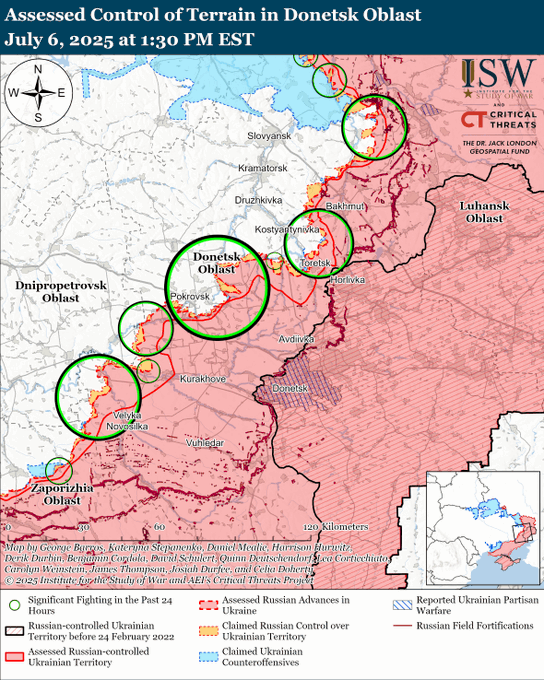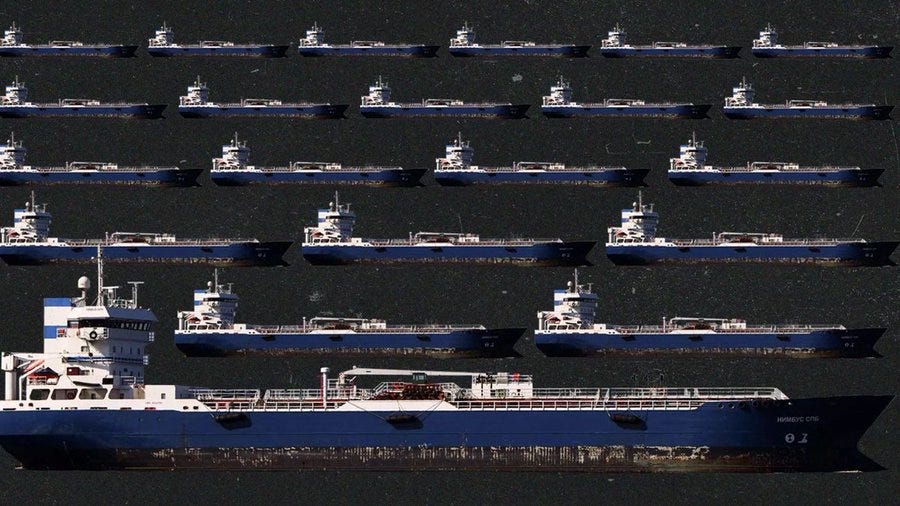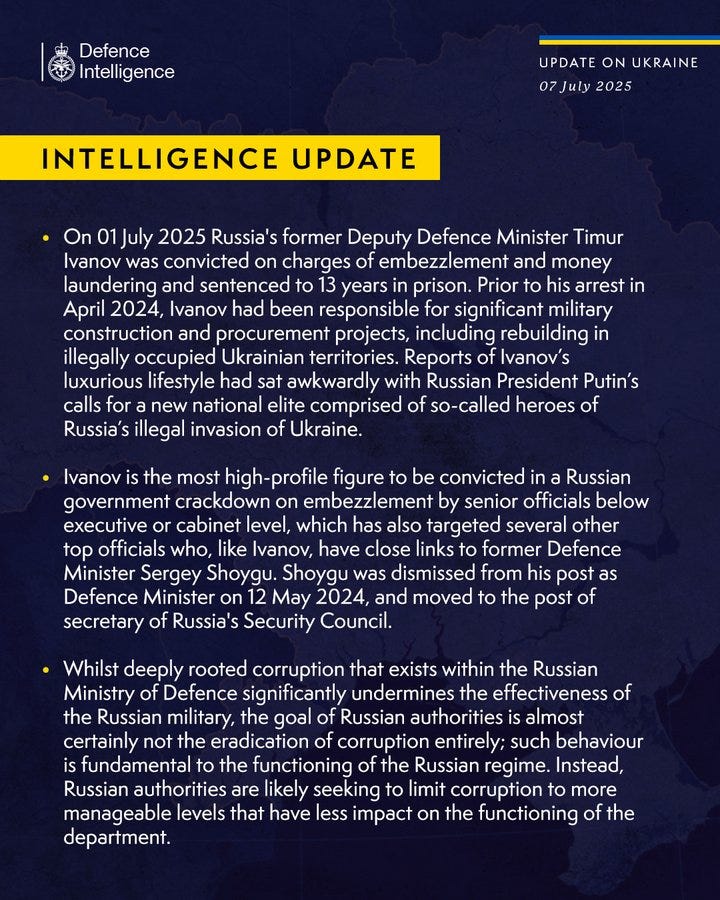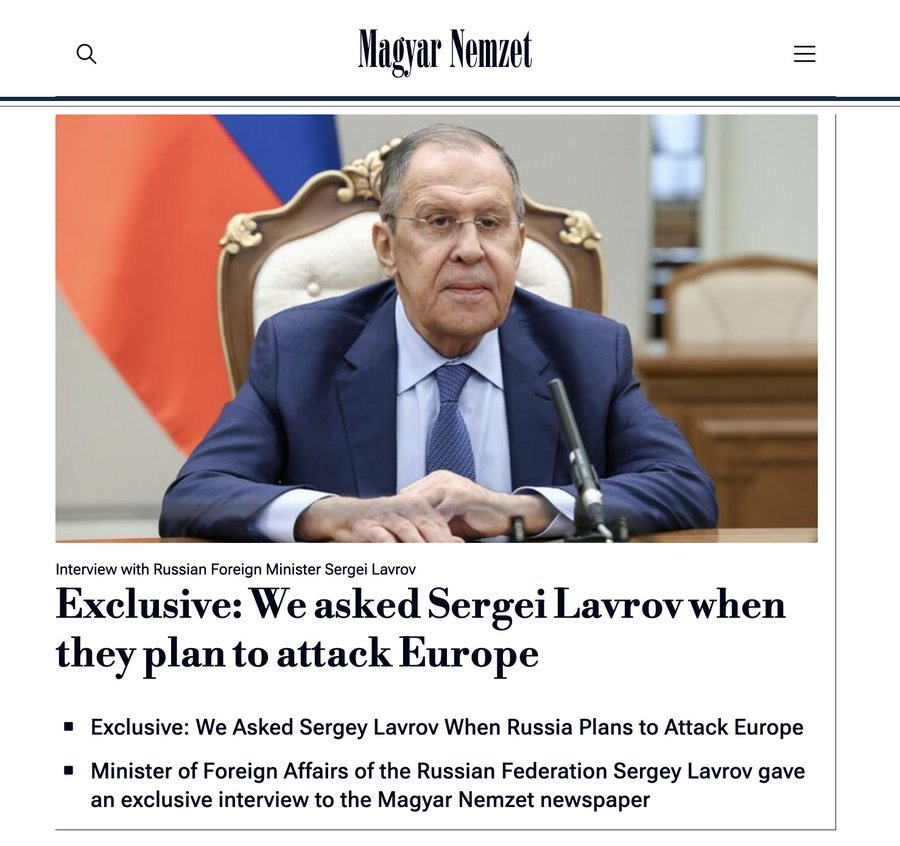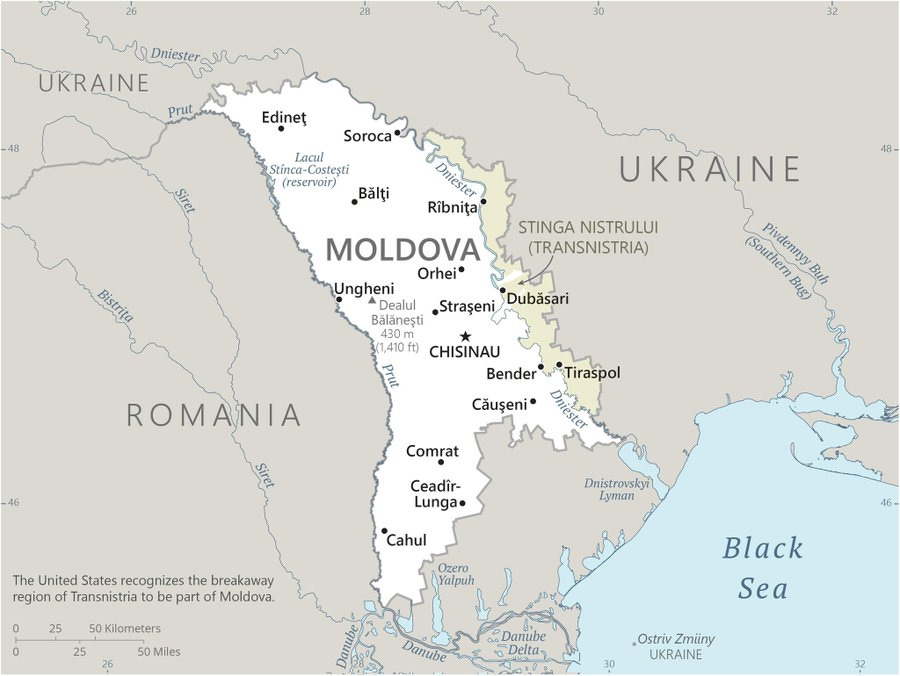Catching up…
For a general view of news from various geopolitical threatres, Scott’s EA Worldview is always superb.
Please note: I managed to throw someting together. E-Stories will not be published on Wednesday July 9.
Stories we’re following…
During the night of July 6–7, Russia launched 101 Shahed-type and other strike drones, along with 4 S-300/400 missiles from Kursk region. Ukrainian air defense neutralized 75 drones—58 shot down and 17 jammed.
Russian attacks across Ukraine kill 6, injure 25 over past day. Russian forces launched four S-300 anti-aircraft missiles and 157 Shahed drones against Ukraine overnight, according to Ukraine's Air Force.
Zarina Zabrisky: A Russian drone attacks families working in the fields in the Kherson region. Human safari goes on.
On Monday morning, a Russian drone strike hit a residential building in Kharkiv, injuring 27 people, according to Mayor Terekhov.
Overnight drone and missile attacks also hit Kyiv, Sumy, and Odesa—damaging infrastructure, killing at least 3, and leaving hundreds without hot water.
At least 10 people were injured in a drone strike on Zaporizhzhia, according to regional military administration head Ivan Fedorov.
Vinnytsia’s Territorial Recruitment Center is halting operations at its main location due to the tense security situation. The structure is being relocated, likely in response to recent waves of drone attacks targeting such facilities in Poltava and Kremenchuk.
Russia is targeting Ukrainian recruitment centers (TCCs) to destroy mobilization data and disrupt conscription, says Ground Forces spokesman Colonel Sarantsev. He warns the strikes may also deter reservists from reporting in.
Pro-Russian Moldovan fugitive politician and fraudster Ilan Shor has been added to Ukraine’s sanctions list signed by President Zelensky. As reported by the Financial Times, Shor created the A7A5 crypto token to help Russia bypass sanctions, moving around $9.3 billion in just four months.
Combat Situation
ISW: Russian President Vladimir Putin appears to be trying to increase volunteer recruitment among the Russian population, likely due to waning domestic support for the Kremlin's crypto-mobilization efforts. Ukrainian forces recently advanced near Borova. Russian forces recently advanced near Novopavlivka.
For the first time in three years, Russia is assaulting the Zaporizhzhia front along its entire length, reports the commander of Ukraine’s 65th Brigade. Their objective: reach the Mariupol highway, capture Orikhiv and Kamyanske, and push toward Komyshuvakha.
Ukrainian drone strikes to degrade Russian capabilities were plentiful over the weekend and Monday.
Drones reportedly attack Russia's Black Sea fleet. The media outlet also published footage purportedly showing a burning maritime drone that was allegedly shot down during the attack.
Russian airports cancel nearly 300 flights amid drone attacks on Russia. Rosaviatsia reported on the evening of July 6 that 287 flights had been grounded across three major airports: Moscow's Sheremetyevo, St. Petersburg's Pulkovo, and Strigino Airport in Nizhny Novgorod.
Major disruption in Russia as airports in Moscow, St. Petersburg, and Nizhny Novgorod cancel 287 flights and delay over 100 more amid drone threats. St. Petersburg faces internet outages, payment failures, delivery delays, and paralyzed public transport. Taxi prices have skyrocketed—if you can even get one.
7,000 Russians are currently stranded at Pulkovo Airport in St. Petersburg. Over 100 flights delayed and 30 more canceled. A snapshot of growing chaos in Russian airspace.
Ukrainian forces targeted the Krasnozavodsky Chemical Plant, located ~550 km from the front, with FP-1 drones. The facility is crucial for Russia’s production of solid-fuel rocket components, including oxidizers and propellants used in S-300/S-400, Iskander, Buk, and Tor systems, as well as naval and air-launched missiles. It also handles explosive synthesis and munitions disposal.
Explosion damages tanker in Russian port, marking 6th mysterious blast this year. An explosion "of an unknown nature" aboard the Eco Wizard tanker in Russia's Ust-Luga port near St. Petersburg caused an ammonia leak on July 6.
The Kamchatka Krai authorities have begun to restrict mobile internet service due to the "sabotage war" being waged against Russia, the head of the region Vladimir Solodov said. "Our task is to prevent and make it impossible to carry out sabotage on the territory of the Kamchatka Krai. In this regard, interaction regulations have been developed, including restrictions on navigation in Avacha Bay, internet use, and geo-positioning," Solodov said (quoted by TASS). The regional government emphasized that temporary inconveniences associated with internet outages are necessary to ensure the safety of residents. At the same time, they also recalled that there are strategically important facilities in Petropavlovsk-Kamchatsky and Vilyuchinsk. In the latter, in particular, there is a base of the Russian Pacific Fleet with nuclear submarines.
In just one year, Ukraine has ramped up drone production by 900%, now manufacturing over 200,000 UAVs per month, according to Defence Express. A big leap in domestic Ukrainian capabilities.
Pekka Toveri: Russia is already producing 6000 Shaheeds per month, and production is increasing. More capable than before, able to independently select targets, evade air defenses, and operate in swarms. Attacks are particularly aimed at civilians and rescuers. Shaheed operates with Western and Chinese components, and soon 25,000 North Korean workers will be producing them. If anyone imagines that this capability won’t be used against the West after Ukraine, they are truly naive, a paid Putinist, or a fool. Source: The Times, The weapon transforming Putin’s air war — with help from his allies
HS: Did Russia quietly drop a spy ship into the Baltic Sea?
Russia has quietly launched a new ship into the Baltic Sea, reports the defense and security publication Army Recognition .
The vessel, launched from Vyborg, is officially a deep-sea research vessel for the Russian Ministry of Defense. However, the ship is believed to also have a secondary role as a Russian spy ship. The ship is named after the late Vice Admiral Aleksei Burilichev .
According to Army Recognition, the ship is designed to monitor and map – and possibly tamper with – undersea infrastructure. The ship may be of particular interest to submarine cables in NATO countries.
The new ship is part of Russia's Project 22011, which is a continuation of the previous Project 22010. Project 22010 includes the Russian research vessel Yantar, which has been considered a spy ship. Yantar's equipment includes, for example, a deep-sea diving robot called Rus.
According to Army Recognition, the Burilichev, which is 108 meters long and about 17.2 meters wide, is equipped with an advanced sonar, among other things. The ship supports submersibles like the Rus robot, which can dive to depths of up to 6,000 meters.
The vessel is expected to operate in the Baltic Sea, placing it close to critical European undersea infrastructure, such as telecommunications cables.
According to the Russian Ministry of Defense, the marine research vessels are intended for deep-sea research, for example, mapping the seabed. According to Russia, the vessels can also be used for search and rescue operations.
However, according to Army Recognition, NATO and Western countries consider it likely that the ships will also be used for reconnaissance purposes.
Behind the Lines
On July 9, President Zelensky will meet with Italian President Mattarella at the Quirinal Palace in Rome, with the meeting set for 16:00. The following day, the Ukraine Recovery Conference will officially begin in the Italian capital.
China may ask Russia to attack NATO if Taiwan is invaded, Rutte says. Fears of escalating Chinese military intervention in Taiwan have risen sharply since Russia launched its full-scale invasion of Ukraine in February 2022.
German lawmakers call on Merz to increase aid to Ukraine, Bild reports. The signatories emphasized the need to strengthen Ukraine's air defense systems urgently.
Dutch F-35 fighters will patrol NATO airspace in Poland together with Norway from September, Dutch Defense Minister Ruben Brekelmans said . "It is important for the security of the Netherlands to protect NATO's eastern flank... In this way, we will keep Russia at bay and protect Ukraine's supply routes," he said.
Europe’s Baltic flank is finally playing hardball. Sweden and Germany now join Denmark in demanding insurance papers from Russia’s Shadow Fleet—those rusted ghosts sailing under fake flags, dodgy cover, and dubious intent. The EU, U.S., and U.K. have now blacklisted over 700 vessels—more than 10% of the global tanker fleet. Russia, of course, calls it piracy, writes Keith Johnson for Foreign Policy.
While it seems like a niggling bureaucratic and paperwork measure, the lack of proper insurance (principally to pay for the cost of any oil spills) is both the biggest fear Baltic nations have of Russia’s aged and under-regulated fleet and a good indicator of nefarious activity. The idea is that ships without proper insurance—the European Union just banned a big Russian insurer that it said had been providing dubious cover for Moscow’s shadow fleet—will be added to the already large and growing roster of blacklisted vessels by the United States, the United Kingdom, and the EU. That is meant to further constrain Russia’s ability to sidestep Western sanctions on its energy sector and keep financing the war.
“If we are looking for which ones are the real problems, they would be the ones who don’t want to show their papers,” said Kristina Siig, a professor of maritime law at the University of Southern Denmark.
The Cipher Brief: Ukraine officially exited the Ottawa Treaty (UN Mine Ban Treaty) on Monday, freeing the country to produce and stockpile anti-personnel landmines. Kyiv announced its intention to withdraw from the pact on June 29, with the decision coming into effect today. Other European countries — Finland, Poland, Estonia, Latvia, and Lithuania — have either left or announced intentions to leave the treaty. Each cite threats from neighboring Russia, which is not a signatory of the pact, as the reason for their withdrawal; the prospect of a Russian ground invasion, similar to the one Moscow launched against Ukraine in February 2022, looms large for these Eastern Flank countries.
Rubio is headed to Malaysia tomorrow to participate in the ASEAN-U.S. Post-Ministerial Conference, the East Asia Summit Foreign Ministerial, and the ASEAN Regional Forum FMs Meeting. In his first trip to Asia as Secretary of State, he is focused on reaffirming the United States’ commitment to advancing a free, open, and secure Indo-Pacific region, per DoS.
DoS Spokesperson Bruce: “During this trip, the Secretary will highlight the strength of our Comprehensive Strategic Partnership with ASEAN in delivering results for the American people and the people of Southeast Asia, as well as our commitment to building on our Comprehensive Partnership with Malaysia”.
Meanwhile in Russia & China…
Reuters: Russia’s budget deficit hit 3.69 trillion rubles ($46.89 billion) in the first half of 2025—already matching the full-year target of 1.7% of GDP, Reuters reports. Compared to 0.3% in H1 2024, this marks a sharp rise. Spending surged by 20.2%, while revenues grew only 2.8%. Oil and gas revenues dropped 17% year-over-year
Same old same old: A "legally binding" agreement to end the war in Ukraine must include clauses on lifting all sanctions against Russia and returning its frozen assets, Russian Foreign Minister Sergei Lavrov said in an interview with the Hungarian newspaper Magyar Nemzet. "The lifting of anti-Russian sanctions, the withdrawal of all lawsuits against Russia and the return of its assets illegally seized in the West," he specified.
At the same time, Lavrov noted that the war will not end without eliminating its "root causes", so the Kremlin's list of demands still includes "demilitarization, denazification" and Ukraine's non-aligned status. But that's not all. Also, according to the minister, the world community must recognize Crimea, the self-proclaimed Donetsk and Lugansk republics, the Kherson and Zaporizhia regions as part of Russia. Lavrov believes that the basis for this is the "referendums" that took place in these territories in the fall of 2022. However, even the UN emphasized that voting under occupation and military action, " presented as the will of the people", is not considered legal under international law and cannot have legal consequences .
Lavrov added that Russia "was and remains open to a political and diplomatic solution to the Ukrainian conflict, but we must talk about a lasting peace, not a truce." "We do not need the pause that the Kiev regime and its external curators would like to take to regroup troops, continue mobilization and strengthen military potential," he concluded.
RBC.ru: Russians Face Double Taxation When Doing Business with Kazakhstan. The Federal Tax Service has begun sending notices to Russians who received income in Kazakhstan, demanding that they pay personal income tax at the full rate. At the same time, their earnings in Kazakhstan were already subject to personal income tax. The Federal Tax Service said that they are conducting “control measures”.
Starovoit was suicided: Transport Minister Roman Starovoit found dead after sudden dismissal by Putin. Starovoit was found dead from a gunshot wound in Moscow in his Tesla, just hours after Putin dismissed him by decree earlier today, without offering any official explanation about the decision. Russian media are reporting the death as a suicide. His death adds to a growing pattern of sudden and suspicious deaths among high-ranking Russian officials in recent years, many of which remain unresolved or unexplained. Roman Vladimirovich Starovoyt served as Minister of Transport since May 2024. Previously served as Governor of Kursk Region from 2019 to 2024.
Update—The Insider: Former head of the Russian Ministry of Transport Roman Starovoit, whose resignation became known on the morning of July 7, committed suicide on the night of July 5-6. This was reported by the Telegram channels Baza , SHOT , and the Forbes publication, citing sources . At the same time, the day before - on Sunday, July 6 - the department reported on a meeting with the participation of the minister.
According to media reports, Starovoit committed suicide on the night from Saturday to Sunday. The head of the State Duma Defense Committee Andrei Kartapolov also hinted that the suicide could have happened earlier than the media learned about it: in a conversation with the RTVI television channel, he said that the incident happened "quite a long time ago."
Law enforcement officers have detained the former first deputy director of the Russian National Guard, Viktor Strigunov. This was reported by TASS, citing sources in law enforcement agencies. According to RIA Novosti, Strigunov is considered guilty of abuse of office and bribery . Investigative agencies have not yet officially commented on the detention.
The first offers of organized tours to Afghanistan have appeared in Russia. A trip lasting 8 days and 7 nights will cost an average of $3,000 (235,000 rubles). Shot found corresponding advertisements of travel agencies in the RuNet . However, visas for Afghanistan, international flights to Kabul and back, medical insurance and security on site are not included in the price of the trip and must be paid for separately. It is expected that the first group of Russian tourists will set off on a trip to the distant country as early as mid-July.
Reuters: China's export restrictions on rare earths brought parts of the global auto supply chain to a halt, and the US to the negotiating table. But at home, they're a big headache for companies already struggling with a slow economy.
The Luckin Coffee chain is a Chinese outfit that offers low-cost coffee. After being delisted from Nasdaq for inflating its sales, it is making a comeback in New York City by placing 2 locations in high-traffic areas.
Luckin will target cities with large numbers of Chinese students and tourists such as New York. The company has been running advertisements during NBA games to build name recognition ahead of its planned launched. Luckin wants to leverage its experience selling affordable coffee in China and undercut US incumbents by selling drinks priced around $2 or $3.
The US coffee market is fiercely competitive. Besides Starbucks’ nearly 17,000 US stores, coffee-and-doughnuts chain Dunkin’ has more than 9,500 locations. New York-listed Dutch Bros has about 900 drive-through coffee outlets after expanding by a fifth in the past year. Meanwhile, coffee is sold everywhere from McDonald’s to convenience stores. “Luckin faces a new challenge in the US, which is very saturated. Whereas in China it is opening up new markets with its coffee, bringing new consumers to the drink, in the US, the consumers already know what coffee is and have expectations.”
Mo: There are no locations in Italy or the UK, thankfully. Just another example of Chinese penetration with low-cost products with the aim of supplanting western brands.
Szabolcs Panyi: Here’s the current front page of Orbán’s main propaganda mouthpiece, Magyar Nemzet. And yes—by “propaganda” I don’t just mean bias. The paper literally gets its orders from the Prime Minister’s Cabinet Office, which controls both state propaganda and the intelligence services.
Massimiliano Coccia: Iran's Invisible Network in Italy: Spies, Publishing and Digital Propaganda
There is a silent Iran that runs through the meshes of Italian society. Not the one in war chronicles or official press releases, but an Iran that acts under the radar, within cultural centers, religious communities and through a sophisticated apparatus of digital propaganda and soft power . A system designed to build tolerance or adhesion, especially in niche academic, religious and political environments. Thanks to direct and material sources, it emerges that the Islamic Republic has also set up an active surveillance network on dissidents in Italy, made up of shadowing, digital interceptions and targeted intimidation.
Cultural diplomacy and academic investments
The Cultural Center of the Iranian Embassy in Rome, located on Via Nomentana, represents the strategic heart of the cultural diplomacy of the Islamic Republic. This space, formally dedicated to interreligious dialogue and cultural promotion, is in reality an operational hub that coordinates events, conferences and exhibitions with specific political purposes: building consensus around the regime and promoting an image of Iran as a spiritual, anti-imperialist and tolerant state. A central aspect of this strategy is investment in the Italian university system.According to the documents reviewed, in recent years alone, Iranian investments in academic agreements and research projects in Italy have exceeded one million euros. The University of Salento has signed agreements with the Allameh Tabatabai University and the Shahid Beheshti University of Tehran. The Polytechnic University of Milan has started collaborations with the Imam Khomeini International University. Since 2009, La Sapienza University of Rome has maintained a joint center with Iranian partners. The Universities of Florence, Bologna and Turin are also involved in projects ranging from engineering to archaeology, from religious studies to academic mobility.
Shiite mosques and political commemorations
The Shiite presence in Italy is a minority compared to the Sunni one, but well organized and deep-rooted. The main center is the Imam Mahdi Mosque in Rome, in via Spello, a point of reference for the Shiite community and the site of public commemorations such as the one dedicated to Hassan Nasrallah, leader of Hezbollah, which took place last June 5 in the presence of representatives close to the Iranian embassy. The Ahlul Bayt Mosque in Turin, the Al-Rasoul in Milan and the Imam Ali in Bologna also play a similar role. They host celebrations in honor of symbolic figures of the Islamic Republic, spread Shiite religious literature and host events in line with the official narrative of Tehran. These places are not only spaces of worship, but tools for consolidating Iranian cultural and political influence on the territory.Digital propaganda, the role of influencers and links with the far right
Iran in Italy also operates on the digital front, through a layered system of websites, Telegram channels, social networks and video platforms. The Italian version of Press TV, the contents of Radio IRIB, pro-Iranian geopolitical portals and dozens of Telegram channels amplify the regime's narrative on a daily basis, mixing spiritualism, anti-Westernism and historical revisionism. Alongside this, there is the strategy of Iranian influencers living in the country. Figures such as Sadaf Taherian, Elnaz Golrokh or other lifestyle profiles on Instagram and TikTok show an ordinary, reassuring Iran, made of coffee, trips, fashionable clothes and natural landscapes. [continue reading]
In our latest instalment of Screweds and Dudes, Madi and I review some of the geopolitical winners and losers of the week. We touch on a few events that have occurred: successful covert operations in Russia’s east, changes to Azeri attitudes toward Russia and the softening of the South Caucasus and how it will affect Russia’s influence in the region, Canadian action against Chinese espionage efforts, the Trump’s admin holding back armaments to Ukraine, and other topics that would normally have found here in E-Stories over the weekend.
Screweds & Dudes
Thanks for joining us on EuroFile live on Substack for this week’s Screweds & Dudes. For those who missed it, check out the recording for our geopolitical winners and losers.
In Europe…
Moldova's pro-Russian political bloc to participate in upcoming elections. Ilan Shor, an exiled pro-Kremlin oligarch, established the Victory bloc in August 2024. "Our main goal in these elections is to overthrow the fascist regime and hold early democratic elections within the next six months," Shor said on July 6.
Spravdi: Russia is again trying to get its claws into Moldova. The EU is accelerating deployment of its cyber reserve team to protect Moldova from potential Russian interference ahead of the country’s September parliamentary elections. Originally scheduled for December, the mission was moved up due to rising threats. The cyber reserve is a specialized group of experts formed to respond quickly to hacker attacks and hybrid warfare tactics. This rapid move underscores growing fears that Russia may attempt to disrupt Moldova’s democratic process.
The UK is contributing £400,000 to support the Organisation's for the Prohibition of Chemical Weapons (OPCW) efforts in Ukraine, providing equipment, training & expert support to help the country counter chemical threats.
BBC News: State of Terror: There are extraordinary secret surveillance images - now largely forgotten - that in their own grainy and mysterious way, tell the story of missed opportunities that maybe, just maybe, could have stopped the horrific suicide attacks that took place in London 20 years ago.
They are images of the ringleader of the 7/7 bombings - first caught on camera at an al-Qaeda-associated training camp in the Lake District in 2001.
Two more images from 2004 show him - name and intentions then unknown - meeting a different cell of bomb plotters outside London and being followed by an MI5 team as he made his way back to Leeds.
Nobody joined all these dots, and worked out the man was Mohammad Sidique Khan until he and the three other members of his gang had killed 52 people with their four homemade bombs.
Despite being seen meeting other men of real concern, he was never made a priority for investigation.
For months I have been asking many of the top people - from prime ministers through to former extremists - to reflect on what they have learned over the 20 years since 7/7. Sir Tony Blair was prime minister on 7/7. Hindsight, he told me, was a wonderful thing.
I've found that the British state has, arguably, the most evolved and sophisticated suite of powers and tools possible to identify, disrupt, prosecute, ban and jail people for terrorism offences.
But at the same time the threats that those powers are being used to counter today are so much more complex than they were in 2005. And so, 20 years since 7/7, are we any safer now than we were then? Listen to State of Terror on the BBC.
Eerik N. Kross: At the end of the Song Festival concert, 100,000 Estonians sing the Forest Brothers’ song — the iconic anthem of resistance during the Soviet occupation. In the 1980s, singing it in public could earn you a 2–3 year prison sentence — and yet no real Estonian gathering passed without it.
Danish Foreign Minister Lars Løkke Rasmussen amet with Secretary Rubio at the State Dept in Washington on Monday. Ukraine, among other topics, was on top of the agenda.
In other news…
BBC News: Over 100 people have been confirmed dead in central Texas and another 41 are missing following flash floods on 4 July. Most of the deaths confirmed so far, including 28 children, were in Kerr County, where a girls' summer camp was inundated by flood waters. There, the Guadalupe River rose by 26ft (8m) within 45 minutes. The San Gabriel River also burst its banks, with drone footage showing the devastation in Georgetown. Rescuers are searching for the missing, and officials say the death toll is certain to rise. More storms are expected, which could hamper rescue efforts.
Trump said the US will impose an additional 10% tariff on any countries aligning themselves with the "anti-American policies" of the BRICS group of developing nations, whose leaders kicked off a summit in Brazil.
The Cipher Brief: President Donald Trump is hosting Israeli Prime Minister Benjamin Netanyahu at the White House for the third time this year. Instead of formal talks in the Oval Office, this time around, the two leaders will have a private dinner closed to the press. The two leaders may appear to be meeting for a victory lap following the U.S. and Israeli strikes on Iran last month, but there’s far more on the line: Trump wants a Gaza ceasefire deal as the next diplomatic feather in his cap, and experts say he is trying to seize the momentum after the attacks against Iran to secure a breakthrough.
The Houthis said they sunk the Liberian-flagged, Greek-owned bulk carrier Magic Seas on Monday. The ship was reportedly hit by fire on Sunday from the Houthi-controlled port city of Hodeidah. The sinking has yet to be independently verified, but if confirmed, this will be the third ship the Houthis have sunk since they started targeting ships in the Red Sea. Meanwhile, the private security firm Ambrey reported another cargo ship in the area came under fire today.
Donald Trump called Elon Musk's plans to form a new political party "ridiculous," launching new barbs and saying the Musk ally he once named to lead NASA would have presented a conflict of interest given Musk's business interests in space.
Elon Musk’s father has stirred controversy by telling Russian media he’d like to visit occupied regions of Ukraine and encouraged his son to visit Russia. He referred to Ukraine’s internationally recognized borders as “artificial” and claimed the annexed territories have “reunited” with Russia—a statement echoing Kremlin propaganda.




